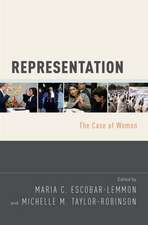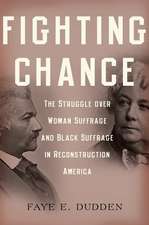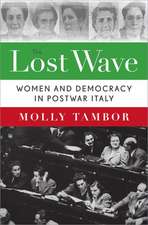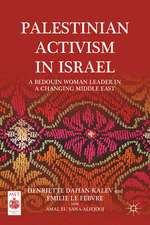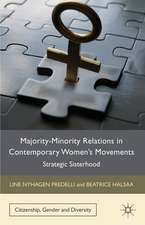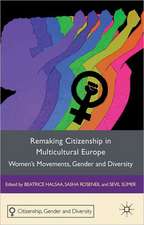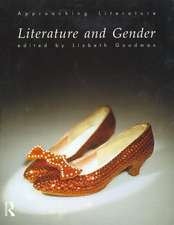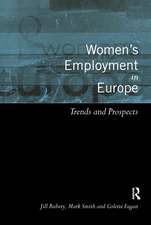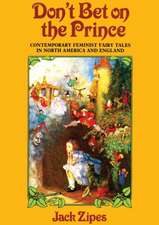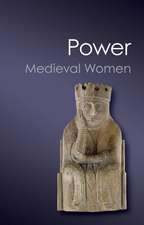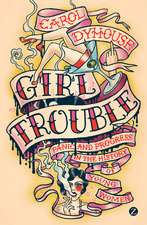Feminism and 'The Schooling Scandal'
Autor Christine Skelton, Becky Francisen Limba Engleză Hardback – 15 dec 2008
- social class, ethnicity and sexuality in relation to experiences in school;
- theories and methodologies for understanding gender;
- pedagogy and practice in education; and
- the direction of educational policy and the ‘problem of boys’.
| Toate formatele și edițiile | Preț | Express |
|---|---|---|
| Paperback (1) | 256.76 lei 6-8 săpt. | |
| Taylor & Francis – 15 dec 2008 | 256.76 lei 6-8 săpt. | |
| Hardback (1) | 765.04 lei 6-8 săpt. | |
| Taylor & Francis – 15 dec 2008 | 765.04 lei 6-8 săpt. |
Preț: 765.04 lei
Preț vechi: 1027.91 lei
-26% Nou
Puncte Express: 1148
Preț estimativ în valută:
146.39€ • 153.25$ • 121.13£
146.39€ • 153.25$ • 121.13£
Carte tipărită la comandă
Livrare economică 05-19 aprilie
Preluare comenzi: 021 569.72.76
Specificații
ISBN-13: 9780415455091
ISBN-10: 041545509X
Pagini: 184
Ilustrații: 7 tables
Dimensiuni: 156 x 234 mm
Greutate: 0.5 kg
Ediția:1
Editura: Taylor & Francis
Colecția Routledge
Locul publicării:Oxford, United Kingdom
ISBN-10: 041545509X
Pagini: 184
Ilustrații: 7 tables
Dimensiuni: 156 x 234 mm
Greutate: 0.5 kg
Ediția:1
Editura: Taylor & Francis
Colecția Routledge
Locul publicării:Oxford, United Kingdom
Public țintă
Postgraduate and UndergraduateCuprins
Chapter 1 Introduction Chapter 2 Sex Roles and Schooling Chapter 3 Social Class in Schooling Chapter 4 Ethnicity, Gender and Education Chapter 5 Sexualities and Sexual Harassment in Schools Chapter 6 Curriculum, Knowledge and Schooling Chapter 7 Schools and Boys Chapter 8 Gender and Teaching
Notă biografică
Christine Skelton is Professor of Gender Equality in Education, University of Birmingham.
Becky Francis is Professor of Education at the School of Education, Roehampton University.
Becky Francis is Professor of Education at the School of Education, Roehampton University.
Recenzii
Review - Martin Mills
Review: Jane Martin
This is a timely proposal for the UK market. I very much like the proposed title although it does promise rather more than the outline delivers given the focus on education feminisms. I also use the plural quite deliberately here. This reader would like to see the very promising indicative content of the substantive chapters situated in a discussion of the wider social and political context that framed the work of the British feminist academics to be discussed here. In addition it needs to be clearly specified that the particular focus is on the work of sociologists of education. For instance, there is no mention of feminist historians writing on gender and education in the specified time period such as Carol Dyhouse and June Purvis, who were (and are) clearly influential in the field. Indeed Purvis was one of the ‘founding mothers’ of the journal Gender and Education. I have some reservations about the use of the term ‘founding mothers’ and the authors should note the critique of this approach by Kathleen Weiler in response to a US collection edited by Alan Sadonovik and Susan Semel. The key themes covered in the 7 chapters are appropriate and would provide a useful compilation but it seems the authors are asking a lot of what they describe as a ‘brief introductory chapter’ in terms of setting the scene more generally as well as introducing the themes of the book as a whole to be picked up in subsequent chapters.
In terms of competing books, it is worth noting the scope of Christina Hughes’ book, Key Concepts in Feminist Theory and Research, published by Sage. I agree with the authors that there is no identical book and that the readers they cite offer something rather different. (The Education Feminism Reader edited by Lynda Stone and published in 1994 is more international in scope as the three readers compiled for the Open University course on gender and education which used to be a module for the MA in Education.)
I would anticipate the principal market as in the UK though it maybe this could be broadened with greater reference to feminist activism in an early chapter and the cross fertilisation of ideas from the civil rights movement and the women’s liberation movement. The authors indicate a student market and I would expect the book to be used as recommended reading for many courses and as a main text for specialist courses on gender and education at undergraduate and postgraduate level. The proposed book has the advantage of offering a coherent overview by two authorities in the field and this is distinctive to that offered by a reader or any other kind of edited collection. In terms of modifications to the coverage I would like to see greater attention to the wider context to the education feminisms debate than is apparent in the proposal as it currently stands. In terms of pricing I consider it important to consider that it is being aimed at students and to price it accordingly e.g. £16.99. In sum, I would recommend publication.
Review – Jill Blackmore
Such a text is a worthwhile project. An historical perspective on how feminist theory and educational feminists have informed the ways in which gender is now understood and come to be represented in contemporary policy and practice is an important one in the context of current discourses around gender and equity that indicate significant historical amnesia. It certainly will appeal to gender equity researchers new to the field. Backtracking the origins of particular debates reminds us how particular issues come to be foregrounded in particular contexts and to whose benefit. This text would undermine various mythologies that have come to be treated as truths eg class or race has not been an issue amongst feminists, all girls are successful etc. What such a text will do is indicate how particular issues are recycled and reinvented in different ways in different contexts, what the shifts in discourses are, the absences and silences.
There are some readers and handbooks texts that include key education feminists that would be the primary competitors to this text, some of them by the same authors in the same market. What is different about this text is the explicit aim to position key debates within the historical context and therefore provide a wider context to feminisms theoretical influence in schooling.
Both authors have international reputations gained from undertaking excellent theoretical and policy work in the area of gender and schooling. There is little question that the text will be relevant, timely and also attract buyers and users because of the authors and the content.
- This book would make a great addition to the gender and education literature. The book would appeal to scholars – academics and graduate students - working in the fields of gender and education, sociology of education and educational policy. The book will also be useful for some undergraduate courses. I cannot predict numbers of sales, however it would certainly be an essential purchase for those working in the area in the UK, US and Australasia.
- It would be a good text book in gender and education courses; recommended reading in sociology of education and policy courses, and an essential purchase for scholars ion the area and all university libraries.
- Skelton & Francis (eds), Investigating Gender; Arnot & Mac an Ghaill (eds), RoutledgeFalmer Reader in Gender and Education; Skelton, Francis & Smulyan (eds), Sage Handbook of Gender and Education; Skelton & Francis (eds) A Feminist Critique of Education: 15 years of Gender Education. The main competitors for this title will be the authors’ already published works. However, this work clearly is different from what they published before. The authors are two of the most prominent current contributors to the field of gender and education. This book will provide a thorough account of the development of the field, and has the advantage of being written by people who are currently constructing the field. That this is not an edited collection is also an advantage.
- This is likely to be a landmark book, as such it is likely to be a key text for many years and will become an important reference point as the gender and education field develops further.
- The authors are two of the most cited and highly regarded academics in this field.
- It is comprehensive and more than adequate.
- All I can say is that I would have no hesitation whatsoever in publishing this book.
Review: Jane Martin
This is a timely proposal for the UK market. I very much like the proposed title although it does promise rather more than the outline delivers given the focus on education feminisms. I also use the plural quite deliberately here. This reader would like to see the very promising indicative content of the substantive chapters situated in a discussion of the wider social and political context that framed the work of the British feminist academics to be discussed here. In addition it needs to be clearly specified that the particular focus is on the work of sociologists of education. For instance, there is no mention of feminist historians writing on gender and education in the specified time period such as Carol Dyhouse and June Purvis, who were (and are) clearly influential in the field. Indeed Purvis was one of the ‘founding mothers’ of the journal Gender and Education. I have some reservations about the use of the term ‘founding mothers’ and the authors should note the critique of this approach by Kathleen Weiler in response to a US collection edited by Alan Sadonovik and Susan Semel. The key themes covered in the 7 chapters are appropriate and would provide a useful compilation but it seems the authors are asking a lot of what they describe as a ‘brief introductory chapter’ in terms of setting the scene more generally as well as introducing the themes of the book as a whole to be picked up in subsequent chapters.
In terms of competing books, it is worth noting the scope of Christina Hughes’ book, Key Concepts in Feminist Theory and Research, published by Sage. I agree with the authors that there is no identical book and that the readers they cite offer something rather different. (The Education Feminism Reader edited by Lynda Stone and published in 1994 is more international in scope as the three readers compiled for the Open University course on gender and education which used to be a module for the MA in Education.)
I would anticipate the principal market as in the UK though it maybe this could be broadened with greater reference to feminist activism in an early chapter and the cross fertilisation of ideas from the civil rights movement and the women’s liberation movement. The authors indicate a student market and I would expect the book to be used as recommended reading for many courses and as a main text for specialist courses on gender and education at undergraduate and postgraduate level. The proposed book has the advantage of offering a coherent overview by two authorities in the field and this is distinctive to that offered by a reader or any other kind of edited collection. In terms of modifications to the coverage I would like to see greater attention to the wider context to the education feminisms debate than is apparent in the proposal as it currently stands. In terms of pricing I consider it important to consider that it is being aimed at students and to price it accordingly e.g. £16.99. In sum, I would recommend publication.
Review – Jill Blackmore
Such a text is a worthwhile project. An historical perspective on how feminist theory and educational feminists have informed the ways in which gender is now understood and come to be represented in contemporary policy and practice is an important one in the context of current discourses around gender and equity that indicate significant historical amnesia. It certainly will appeal to gender equity researchers new to the field. Backtracking the origins of particular debates reminds us how particular issues come to be foregrounded in particular contexts and to whose benefit. This text would undermine various mythologies that have come to be treated as truths eg class or race has not been an issue amongst feminists, all girls are successful etc. What such a text will do is indicate how particular issues are recycled and reinvented in different ways in different contexts, what the shifts in discourses are, the absences and silences.
There are some readers and handbooks texts that include key education feminists that would be the primary competitors to this text, some of them by the same authors in the same market. What is different about this text is the explicit aim to position key debates within the historical context and therefore provide a wider context to feminisms theoretical influence in schooling.
Both authors have international reputations gained from undertaking excellent theoretical and policy work in the area of gender and schooling. There is little question that the text will be relevant, timely and also attract buyers and users because of the authors and the content.
Descriere
Brings together feminist contributions from two generations of educational researchers to provide a comprehensive overview of contemporary research and theory emerging from ‘second wave’ feminism and assesses their impact on pupils and teachers in today’s schools and classrooms.

